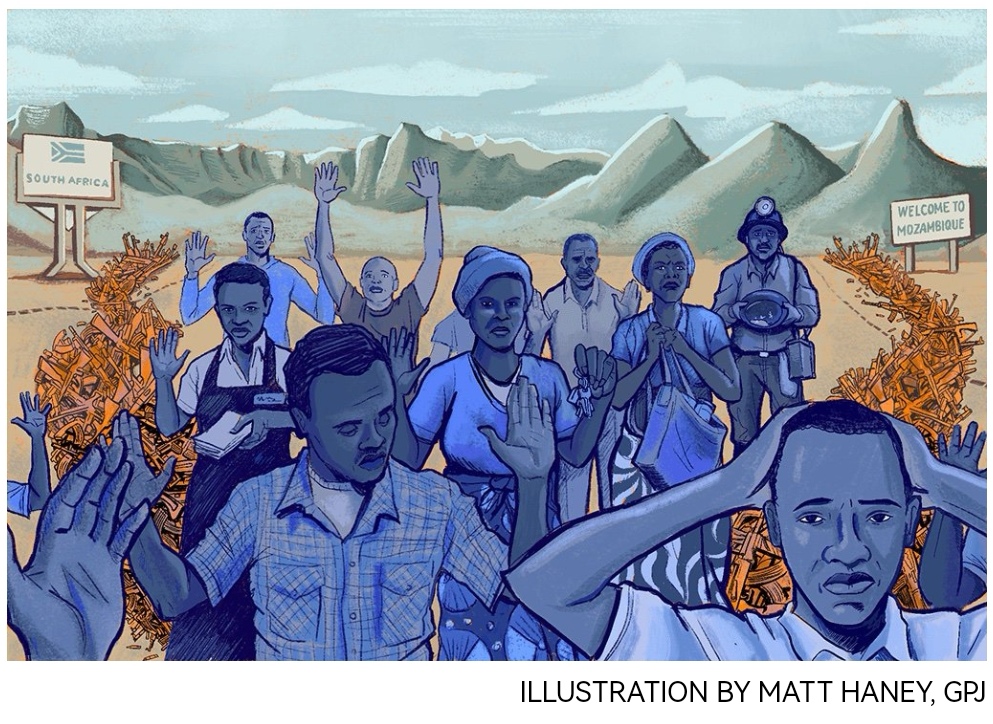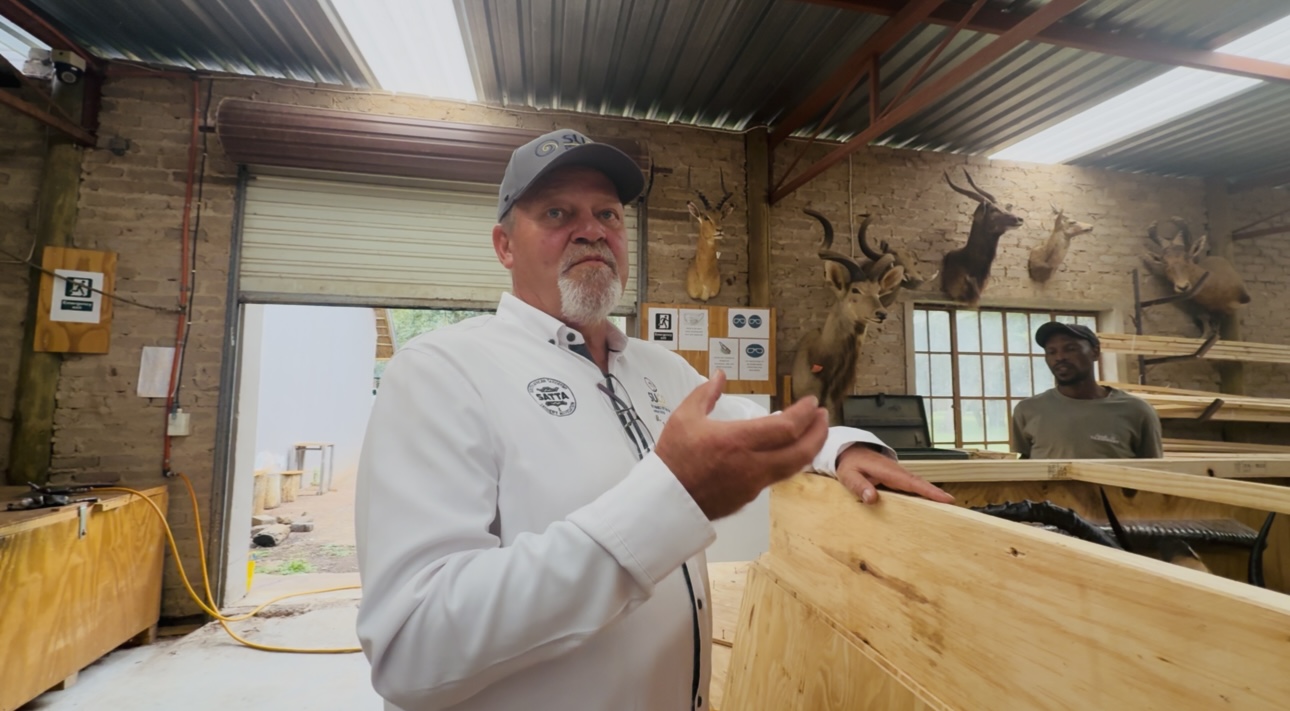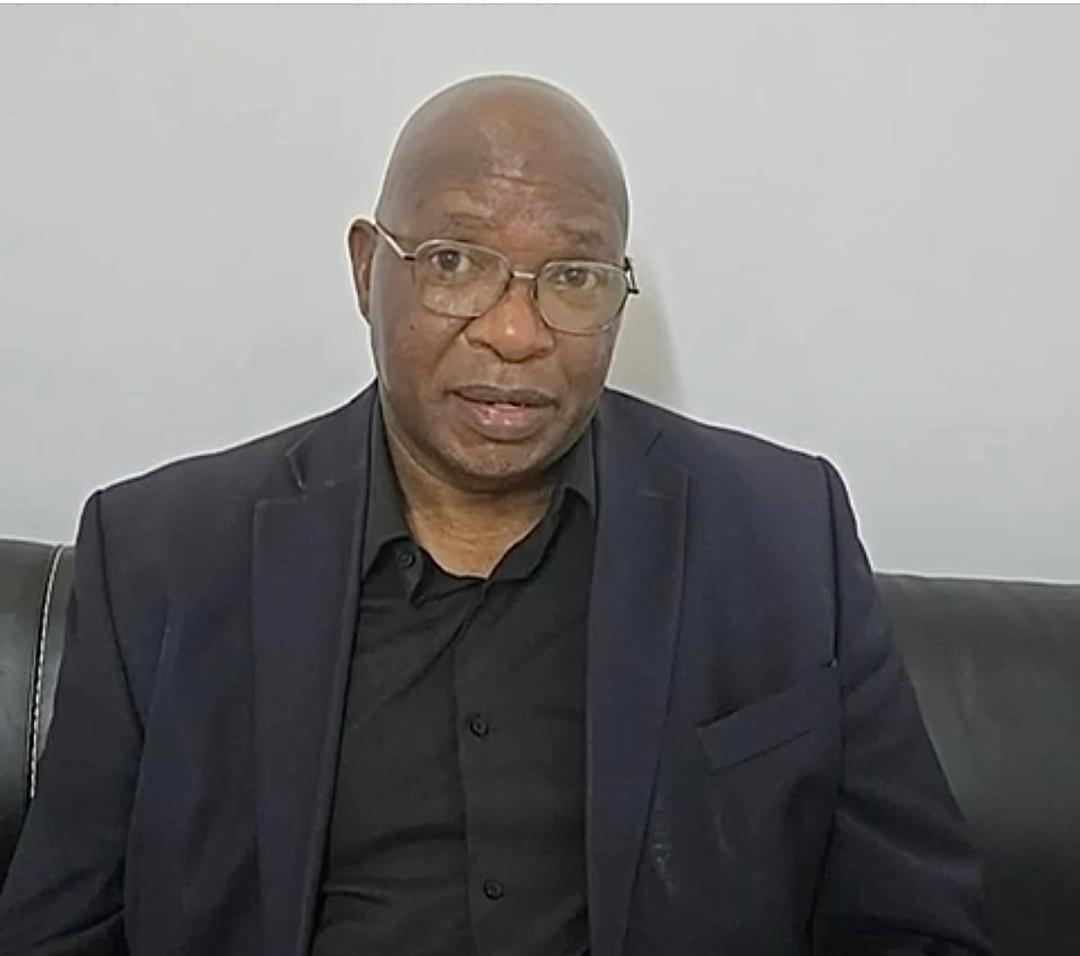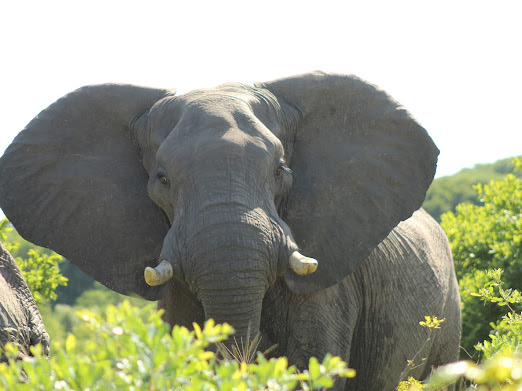Special reports
As guns flow in from neighboring countries, armed robberies spike
Published
3 years agoon
By
VicFallsLive
BY EVIDENCE CHENJERAI
Christopher Holland believed he had done all he could to secure his home: two vicious dogs permanently stationed in the front yard and wall-to-wall security. But as he arrived home from work one day and turned off his alarm, two men in ski masks stormed in after him.
“They started shouting, ordering me to lie down on the floor,” Holland recalls of the evening in February 2017, when he found himself alone in his home with two violent intruders. “They tied my hands, punched me ruthlessly and demanded to know where everything valuable was.”
Holding a gun to his head, the intruders marched him around his home while taking his most valuable possessions. Holland, 67, says he begged for his life, but only when he asked for water, dehydrated by the ordeal, did the men leave his home.
In response to the attack, Holland added more security to his home, but two years later, it happened again — this time when his wife was with him. As the gate to his yard closed behind the couple, two masked men approached him from behind, and one held a gun to his head while the other grabbed his wife. Unlike the first incident, Holland fought back but was hit three times in the head. As he tackled one of the masked intruders, his attacker aimed the gun at him and pulled the trigger. “By some divine intervention he missed,” he says.Holland is one of the more than 1,000 people who experience armed robberies annually in Zimbabwe, a number that has been rising steadily and is linked to an increase in the number of illegal firearms smuggled in from neighboring countries. Last year, President Emmerson Mnangagwa held a gun amnesty for the first time in two decades. More than 530 firearms were surrendered to the police during the nearly two-month-long amnesty, compared with the previous one, when no guns were surrendered.
While the amnesty was hailed as a success, the number of guns surrendered is small compared with the 264,315 unregistered guns believed to be in the landlocked country, according to the most recent figures published in 2017 by Small Arms Survey, an independent research project. Meanwhile, armed robberies continue to rise. According to the Zimbabwe National Statistics Agency, robberies increased from 2017 to 2019, with the number of armed robberies almost doubling from 2018 to 2019.
Inmates serving sentences for armed robbery admit the guns they used in their crimes were smuggled into Zimbabwe through its many porous border posts with South Africa and Mozambique. According to the Global Initiative Against Transnational Organized Crime, an independent civil society organization based in Switzerland, southern Africa is “awash with illegal firearms fueling violence.”
The organization estimates about 3.8 million unregistered illegal firearms are in circulation among the three countries.Michael Sithole and Stanley Tigere, both serving sentences for armed robbery at Mutare Farm Prison, say the guns they used were sourced from Mozambique. Sithole was an aspiring musician when he was recruited by a friend from Mozambique who gave him a gun and taught him how to use it. They both targeted homes in 2009 and 2010, until Sithole was caught and given a 26-year sentence.
Tigere says he and his friends targeted businesses taking cash. “The guns we used, we got them from Mozambique, where we would take them from those patrolling along the Forbes Border post in Mutare,” he says, referring to stealing or forcefully taking guns from the soldiers who guard the border between Zimbabwe and Mozambique.
John Sithole, who is serving a 31-year sentence for several counts of robbery and possession of firearms, says the gun he used in armed robberies belonged to his partner, whom he wouldn’t name. “My partner had connections in South Africa and got the guns from there,” he says.
Anyone possessing a gun without a certificate could be jailed for up to five years in Zimbabwe, according to the country’s Firearms Act, established in 1957. Legal practitioner Miriam Tose Majome says there have been no recent changes to laws regarding gun ownership, possession and usage as illegal gun ownership continues to rise.
“In my view, it [gun ownership] has more to do with economics, rising poverty and unemployment levels,” she says. “Personal values have been eroded, there is growing weakening of traditional values and principles of hard work and delayed gratuity in preference for a get-rich-quick value system. If Zimbabwean law enforcement authorities do not put in enough measures to curb gun crime, it has the capacity to even exceed South Africa’s levels. Anything is possible.”Ruth Mavhunga Maboyi, deputy minister at the Ministry of Home Affairs and Cultural Heritage, considers the most recent gun amnesty a success. “If we had not called for the amnesty, those guns surrendered would still be out there, but people decided to bring them in, which means now there are less unregistered guns out there,” Maboyi said in a phone interview.
Following the amnesty, Paul Nyathi, Zimbabwe Republic Police assistant commissioner, said in a press statement that officers would continue the fight against illegal arms coming into the country and are carrying out checks on properties where they suspect illegal firearms are kept. Nyathi says they are also focusing on reducing armed robberies. In a texted statement, he told Global Press Journal that police have a “coterie of measures to fight armed robberies” that include “campaigns, patrols and community policing initiatives such as neighborhood watch committees.” Nyathi added that police do not have any figures on illegally owned guns in the country.
Holland would like to see stricter gun laws in place given the change in gun culture; he remembers a time when people had guns for shooting small animals and thieves didn’t carry them. Now he and his wife are afraid to go out at night.
“Being robbed is traumatic, and I do not wish that experience on anyone,” he says- Global Press Journal
You may like
Slider
From skins to steaks — How wildlife trade is fueling communities in South Africa
Published
4 weeks agoon
December 11, 2025By
VicFallsLive
BY NOKUTHABA DLAMINI
In the small town of Bela-Bela, a quietly flourishing business is unfolding — one that turns wildlife into livelihood, education, and economic opportunity. On a humid afternoon, we walked into the operations of Estelle Nel Taxidermy (and its parent networks), where rows of beautiful animal mounts — from antelope horns to zebra skins, skulls to full-body trophies — line the walls.

But beyond the busts and custom mounts lies a deeper purpose: this is not simply a display of hunting trophies. It is a system of sustainable use — where animals that die naturally or are hunted legally are completely utilised: meat, skin, horns, bones — nothing goes to waste, and everything acquires value.
As we discovered from our conversations, this network extends beyond taxidermy. Adjacent to the showrooms are processing facilities, butcheries, and game-meat wholesalers — all integral to transforming South Africa’s wild fauna into a formal, regulated, and sustainable economy.
“This is home” — an artisan’s vocation
I sat down with Melanie Viljoen, who serves as Export Secretary at Estelle Nel Taxidermy. Her voice was calm, resolute.

“For me, it’s like this is home and it’s something that I love to do. I love art. I studied art at school. I can’t think of anything else I’d rather do.”
She told us she’s been with the business for thirteen to fourteen years. Over that time she’s mastered a unique craft. “I’ve found my niche,” she said, “and I’m not going anywhere.”
Melanie explained how the business flows: outfitters bring in international clients to hunt on private farms, then process the animals: trophy mounts for some, meat for others. Locals also bring animals — sometimes for trophies, sometimes just for meat. There is even “school-mount” work: smaller species, sometimes a mother and its young, carefully preserved — not just for hunters, but for children to touch and learn about wildlife up close.
“We mount animals that have died naturally or were hunted… we use everything, from the meat to the skins and curls. It’s a sustainable way of doing business, and everything has a monetary value.”

This, she says, is both business and passion — blending artistry, conservation, and commerce.
From workshops to global markets — taxidermy meets commerce
According to membership details o South African Taxidermy & Tannery Association, Estelle Nel Taxidermy offers a wide range of services: from mounting mammals, birds, reptiles; tanning skins and capes; cleaning, mounting and articulating skulls, bones, horns, tusks; to producing novelty leather items, polished horn décor, engraved bones, hoof lamps — even gunbags and furniture. They offer full export packing and crating services, and help clients ship internationally.
What this means is that skins, hides and trophies — once the culmination of a hunt — become far more than personal souvenirs. They become export commodities, contributing to livelihoods of artisans, packers, shippers, and everyone in between.
Yet, as Pieter Swart President of South African Taxidermy & Tannery Association (SATTA)/chairman of SUCO-SA) told us, that path to global markets is not without obstacles.
“Certain airlines allow the shipping of these trophies. I think it’s about four airlines that you can ship them overseas, but the rest refuse to take their hunting trophies to destinations. As well as the sea shipments — there’s only one ship going to America every three months. The rest of the shipping lines refuse to take hunting trophies.”
He lamented the difficulty in logistics. And yet, he sees themselves as part of a broader — and misunderstood — effort. “This anti-animal works movement created the idea that hunting is killing the animals and destroying them to extinction — but that is actually quite the opposite,” he said. “More and more, the guys are farming the animals; that is creating a better future for the animals.”
In other words: regulated, sustainable use — of every part of the animal — can coexist with conservation, economic empowerment, and community upliftment.
Next door to the taxidermy showroom, we toured a modest but hygienic meat-processing Camo Meat facility, run by people like Ina Hechter. They explained that their business started small — in 2012 as a private processing butcher for animals from farms. Around 2017 they expanded into wholesale for local markets. Export remains limited, but local demand is growing.

Their meats include species typical of the South African game-meat industry: kudu, impala, springbok, wildebeest, zebra and others. What began as a niche — somewhat stigmatised — trade is slowly gaining acceptance. Some supermarkets and lodges are carrying game meat; more restaurants are offering “veld flavour.”
Ina told me that in times of drought — when traditional livestock farming may suffer — game-meat businesses often see increased activity. Farms with overstocked wildlife or animals unable to survive drought may harvest and sell meat, skins and other resources. In this way, what might have been a loss can become income, conservation, and food security.
“Our parks are so small that they can’t sustain all the animals that are there,” Ina said. “Especially in drought years … when it’s not raining a lot you will see they die and then they sell the animals.”M
She sees game meat not only as a business, but as part of a broader sustainable economy — offering healthy, lean protein to consumers, easing pressure on overburdened habitats, and circulating value in rural and peri-urban communities.
More than meat and trophies — a conservation-economy model
What struck me during the tour was how holistic the operation is. It isn’t just about hunters bringing back trophies. It’s about using every bit of what exists: meat, skins, hides, horns, bones — even skulls, and decorative by-products. From full-body mounts to polished horn décor, from retail game-meat packages to furniture made from hoofs: this is a full-value chain.
Companies like Estelle Nel Taxidermy are members of formal trade associations and provide professional services — tanning, mounting, packing, export documentation — and in doing so, they help formalize trade in wildlife products.
Meanwhile, the game meat industry — though historically informal — is slowly growing more regulated. According to a recent national biodiversity-economy strategy, game-meat production supports economic growth, food security, and employment. The most commonly produced and consumed species: impala, kudu, wildebeest, springbok.
In other words: when properly managed, this sector has the potential to transform perceptions of wildlife — from being simply “wild animals” to resources that can feed, employ and uplift entire communities.
Challenges — logistics, stigma, regulation
But it’s not all smooth. As Pieter Swart highlighted, export logistics remain a bottleneck: only a few airlines transport trophies; shipping lines are often reluctant; sea freight to markets like the United States may come only every few months. This makes it harder for the industry to scale globally.
Domestically, the market for game meat and wildlife products still battles cultural and regulatory stigma. Many people still frown at game meat; supermarkets and restaurants are only slowly integrating it.
Regulation is another issue: for the industry to be sustainable, wildlife needs to be farmed or managed responsibly, harvesting must follow quotas, and processing must meet health and safety standards. When abattoirs, tanneries, and exporting agents comply with regulation, this gives the industry legitimacy — but it also requires oversight, capacity, and buy-in from all stakeholders.
Our visit painted a picture of a wildlife economy that’s evolving: where skilled artisans turn skins, horns, skulls into enduring art; where processors supply game meat to homes, restaurants and hotels; where farms, outfitters, taxidermists, meat processors, exporters, and even children (learning from mounted displays) all form part of an ecosystem.
It’s a world that challenges simplistic ideas of wildlife as either “pristine wilderness” or “endangered species.” Instead, it shows how — if managed with respect, regulation, and purpose — natural resources can sustain livelihoods, build economies, and forge a bridge between conservation and commerce.
For many of those involved — from Melanie Viljoen to Ina Hechter and Pieter Swart — it’s not just business. It’s home. It’s art. It’s the future.
Slider
Zimbabwe pushes youth-centred, rights-based, and community-driven reforms ahead of CITES CoP20
Published
2 months agoon
November 20, 2025By
VicFallsLive
BY NOKUTHABA DLAMINI
As the world prepares for the 20th Conference of the Parties (CoP20) to the Convention on International Trade in Endangered Species of Wild Fauna and Flora (CITES), Zimbabwe has outlined a bold and comprehensive policy agenda that shifts global discussions beyond ivory and toward broader issues of sustainable use, human rights, and community empowerment.
In an exclusive interview with VicFallsLive, Dr. Agrippa Sora, board chairman of the Zimbabwe Parks and Wildlife Management Authority (ZimParks), said the country’s proposals are anchored on a simple but transformative message: wildlife conservation must deliver real benefits to the people living with wildlife.
 Key proposals Zimbabwe taking to CITES CoP20
Key proposals Zimbabwe taking to CITES CoP20
1. Commercial trade in elephant leather products
Zimbabwe is pushing for approval to engage in regulated commercial trade in elephant leather products. Authorities argue that this form of value addition can bring economic gains to local communities, promote sustainable use, and reduce reliance on donor funding.
2. A formal voice for communities within CITES
Zimbabwe is advocating for the establishment of an Advisory Body or Community Forum within CITES, ensuring that the voices of rural people—who coexist with wildlife—formally shape decisions on international trade, conservation restrictions, and benefit-sharing.
This push echoes one of the founding principles of CITES, which acknowledges that “peoples and States are and should be the best protectors of their own wild fauna and flora.”
3. Recognition of human rights within conservation governance
Zimbabwe’s delegation wants CoP20 to acknowledge the human rights dimensions of conservation—particularly:
- The right to safety for communities facing human–wildlife conflict
- The right to food security
- The right to benefit from natural resources within their landscapes
For Zimbabwe, these rights are inseparable from wildlife management.
Moving beyond ivory: A broader view of sustainable use
Dr. Sora emphasized that Zimbabwe does not want the CoP20 debate to be reduced to ivory.
Zimbabwe argues that without these broader interventions, the conservation model remains unbalanced—protecting wildlife while leaving the people who live among it trapped in poverty
Youth at the centre of the conservation agenda
One of the strongest themes in Zimbabwe’s CoP20 position is youth empowerment, an area Dr. Sora said is now central to national conservation policy.
“Zimbabwe is supporting the Youth Ethnic Conservation Agenda, and we want to continue empowering young people,” Dr. Sora said.
“These are young people who travel long distances between villages and shopping centres, often unaware of wildlife incidents happening around them.”
He revealed that Zimbabwe has approved the establishment of a national chapter of the CITES Rural Youth Network, a platform designed to give young rural citizens a voice in global conservation decision-making.
Dr. Sora said young people—often traveling long distances between villages and service centres—are the first responders to wildlife encounters, yet are rarely included in policy processes.
“Their inclusion is critical for awareness, safety, and community resilience,” he said.
A rights-based approach linked to national priorities
Dr. Sora linked Zimbabwe’s CITES proposals to the country’s National Development Strategy (NDS2), which prioritises poverty eradication.

“We want to ensure that communities living within wildlife landscapes receive meaningful support and benefits from the natural resources around them,” he said.
This includes promoting value addition—for example, crafting products from elephant leather—and enabling community enterprises tied to legal wildlife products.
“We are promoting opportunities for value addition so that communities can benefit economically from the wildlife with which they coexist.”
He added that the board is committed to transitioning youth from vulnerability to empowerment, ensuring access to education, business opportunities, and long-term livelihoods.
Unlocking finance through sustainable use
Zimbabwe also plans to push for financial mechanisms—particularly the sustainable use of existing wildlife stockpiles—to support community development.
“Our aim is to secure mechanisms that allow us to reinvest in these communities, strengthening their resilience and ensuring they thrive alongside wildlife.”
Zimbabwe argues that restrictive global trade rules deprive communities of funding that could improve safety, reduce human–wildlife conflict, and support conservation programs.
Zimbabwe’s position rooted in CITES founding principles
Zimbabwe’s proposals, Dr. Sora said, are consistent with the spirit of CITES itself.
The convention’s preamble affirms:
Wild fauna and flora are an irreplaceable part of the earth’s natural systems… Peoples and States are and should be the best protectors of their own wild fauna and flora… International cooperation is essential to prevent over-exploitation…
Zimbabwe believes that empowering communities, recognizing human rights, and enabling sustainable use are simply modern applications of these foundational principles.

Preamble:
As VicFallsLive and its staff, we commit ourselves to the highest standards of independent journalism. We serve the public’s right to know in line with Section 20 of Zimbabwe’s donstitution which guarantees this fundamental right in order to allow citizens to make informed decisions and judgments about their society. We pledge to exercise our role with care and responsibility to safeguard public trust in our integrity.
1. Accuracy & sourcing
Our first duty is to report accurately. We will take care to evaluate information provided to us and to cross-check it as much as possible before publishing. We will show readers the chain of evidence we have.
1.1 The more serious and controversial a claim is, the more corroboration will be required before it can be published. A single source will not usually be sufficient. Secondary sources like other newspaper reports will be treated with caution, and clearly identified.
1.2 Anonymous sources will be avoided unless there is no other way to handle a story and there is extensive additional evidence available. Where sources cannot be named, they will still be identified as closely as possible by reference to their organisation, position, relevance to the story or similar safeguards.
1.3 Anonymity will only be granted if the source can persuade us that they have sound reasons for the request. It is not available to people peddling rumour, comment or spin. However, once it has been granted, the newspaper will protect the identity of the source.
1.4 We will take particular care with information that is passed on to us in furtherance of a particular agenda, and will seek additional corroboration in the light of the motives and interests of a source.
1.5 Plagiarism will not be tolerated.
1.6 Headlines, captions and posters will fairly reflect the content of articles.
1.7 Special care will be taken with details like numbers, dates, names and words from languages other than English.
2. Fairness
We will treat the sources and subjects of our reporting fairly, making sure they have a full opportunity to respond to reporting that may affect them.
This means actively seeking out all relevant views and giving people sufficient time to formulate a response. A report can only go ahead without relevant responses if the opportunity to comment has been declined, or if the editor is satisfied that all reasonable measures have been exhausted. In this case, the situation will be explained to readers.
3. Independence
Our journalistic duty to inform the public trumps all other considerations, whether they are financial, political, personal or any other non-professional interests. This includes the business interests of the platform itself. We will avoid conflicts of interest as well as the appearance of conflicts of interest.
3.1 Editorial material will be kept clearly distinct from advertising or any paid-for content. Any outside support for editorial work, such as through sponsored travel, will be declared in the relevant report.
3.2 Gifts, favours and freebies will be handled in accordance with the platform‘s policy, which is designed to underline that our goodwill cannot be bought through these means.
3.3 Journalists may only take on outside paid work if it does not impact on their primary responsibilities or create a perception of a conflict of interest, and then only with the permission of the editor.
3.4 Journalists will bear in mind that their private activities can impact on their and the platform‘s reputation. This extends to opinions expressed on public or semi-public social networking platforms.
4. Minimising harm
We recognise that the media can have a harmful impact on the subjects of our reports, our sources, our audiences and society in general, and pledge to minimise it. We will take particular care when dealing with vulnerable people and groups.
4.1 We will not fuel racism or racist stereotypes and will not tolerate any form of hate speech. However, we will not shy away from reporting issues involving race.
4.3 We will avoid racial labels unless they are essential to understanding. Similarly, we will avoid other labels that may feed into social prejudices of various kinds, around religion, culture, gender, sexual orientation, HIV status and many others. We will be careful to avoid anything that fuels xenophobia.
4.4 We will take note of social sensitivities around religion, death, the portrayal of nudity, sex and violence, the use of strong language and others. We will not offend these sensitivities gratuitously.
4.5 Any infringement of an individual’s privacy – a right guaranteed by law – must be fully justified by a clear and strong public interest. It must be carefully considered, and proportionate to the level of public interest. We recognise that people in positions of importance or who have sought a life in the public eye have a reduced right to privacy and indeed require greater scrutiny.
4.6 We will take great care to avoid the possibility of direct harm to a source. Where this seems possible, extra steps will be taken to make sure the source understands the dangers and gives informed consent, and steps to mitigate the danger are put in place.
4.7 We will take particular care to avoid harm to children. While it is important to seek out the views of children, we will not do anything that may expose them to abuse, discrimination, retribution, embarrassment or any other risk. We will make sure that we consult with a parent or guardian about any impact our reporting may have on the child. We will not use sexualised images of children.
4.8 We will take great care when publishing pictures of children, the disabled, and people in difficult circumstances.
4.9 We will avoid wherever possible publishing photos of corpses or other gruesome pictures which readers may deem offensive. Publication of such photos will only be done when there is a compelling reason to do so.
5. Reporting methods
We will use open, honest means to gather information. Exceptions can only be made when there is strong public interest in a story and there are no alternative methods available.
5.1 We will identify ourselves as reporters to potential sources. We respect the law, and our reporters are required to have a good understanding of relevant legal provisions.
5.2 We will respect off-the-record and similar arrangements. Agreements with sources must be clear, and are binding on the newspaper and its journalists.
5.3 We do not pay for information.
5.4 We do not allow sources to vet our reports before publication. Sometimes, however, it is advisable for reporters to check back to ensure the accuracy of technically complex information, quotes and the like.
5.5 We will keep detailed records of all interviews we conduct, either in note form or preferably as a recording.
6. Accountability
We accept the same level of public scrutiny and accountability as we subject others to. At all times, responses to complaints will be generous, helpful and governed by the need to make sure readers get the fullest information available.
6.1 We will correct errors with due prominence as soon as we become aware of them. Errors online will not be invisibly corrected. Instead, a note with the correction will be posted with the original article.
6.2 In addition to corrections of factual errors, the platformoffers the following corrective measures:
These measures can be used in conjunction, and are at the editor’s discretion.
6.2 We accept the jurisdiction of the Voluntary Media Council
7. General
7.1 VicFallsLive reviews of artistic work are written fairly, in order to help readers decide what to see and how to understand it. They do not offer an opportunity to degrade or humiliate.
7.2 Columnists and commentators are expected to write fairly and honestly, but this does not suggest a bar on strongly opinionated writing. Fact and opinion will be clearly distinguishable. The platform will seek out a wide range of views, including particularly voices not often heard.
7.3 The platform will encourage readers’ involvement in discussion through the feedback on social media pagesetc. Criticism of the platform and its approach is welcome, but basic standards of decency will be enforced.
7.4 This code applies to all staff. Where there is doubt about how to proceed, journalists must take advice from section heads or the editor.
: Gifts, freebies and outside interests policy
This policy is designed to manage the issue of gifts and freebies, in order to avoid an impression of conflicts of interest impacting on the reputation of VicFallsLive and its staff.
1. Gifts and freebies:
1.1 In general, staff are not allowed to accept gifts with a value of over $20.
1.2 Gifts can include cash, items of value, loans, travel, hospitality or other things. Where they are offered for review purposes, tickets to events, books, computer games or similar are not seen as gifts.
1.3 Where practicable and where it would not cause offence, a gift should be returned promptly and with a polite explanation.
1.4 PR handouts that come into the newsroom or to individual journalists must be handed to the managing editor. From time to time, s/he will organise an auction in the newsroom, and the proceeds will be donated to a charity.
1.5 An offer of funded or subsidised travel or hospitality for an editorial purposes can only be accepted with the permission of the editor, who will decide which reporter will take up the offer. Such offers will only be accepted if there is a legitimate news story to write, which the paper otherwise would not be able to afford to cover. Where such an offer is accepted, a note at the end of the report will explain the situation.
1.6 A staffer may not solicit free or discounted food, drink, gifts or similar benefits on the basis of his or her employment as a journalist.
2. Register of interests:
2.1 The managing editor will be in charge of a register of interests, where all editorial staff are required to declare any outside interests, including but not limited to:
Trending
-

 Slider3 years ago
Slider3 years agoInnscor launches brewery to produce Nyathi beer
-

 National4 years ago
National4 years agoIn perched rural Matabeleland North, renewable energy is vital
-

 Tourism and Environment4 years ago
Tourism and Environment4 years agoStrive Masiyiwa’s daughter opens luxury Victoria Falls lodge
-

 Opinion4 years ago
Opinion4 years agoA street art mural in Zimbabwe exposes a divided society
-

 Special reports4 years ago
Special reports4 years agoTinashe Mugabe’s DNA show’s popularity soars, causes discomfort for some
-

 National4 years ago
National4 years agoVictoria Falls’ pilot dies in helicopter crash
-

 National3 years ago
National3 years agoCommission of inquiry findings fail to be tabled as Victoria Falls councillors fight
-

 National3 years ago
National3 years agoHwange coal miner fires workers over salary dispute
